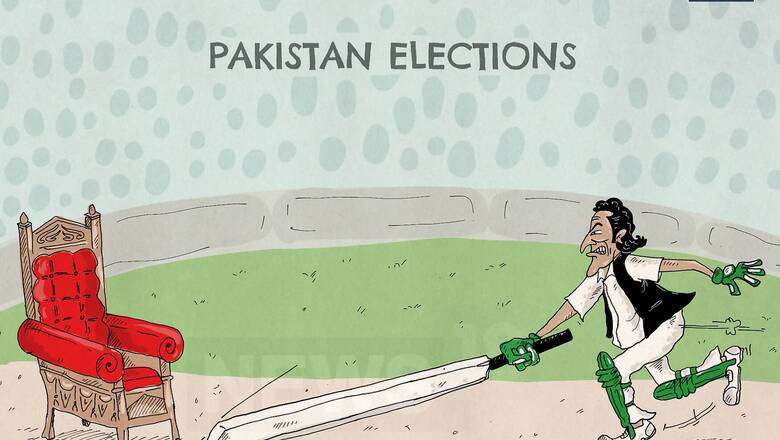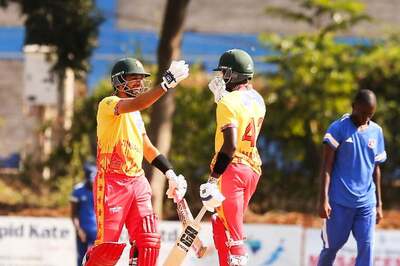
views
Srinagar: In Srinagar’s GB Pant Children Hospital, Showkat Ali, who is in his forties, is attending to his niece in the Intensive Care Unit. The lower half torso of two-year-old Zainab has been struck with paralysis.
Ali has been looking with some hopelessness at his niece for the last four days. Every morning, as doctors come for regular checkups, Ali asks them impatiently about the health of the toddler, limited to her hospital bed.
The attending doctor was caught with surprise when all of a sudden Ali shouted to him, “Now Captain will be the Prime Minister of Pakistan.” Both Ali and the doctor exchanged smiles. The political development in the neighborhood had momentarily excited them both.
A cricket enthusiast, who has stopped playing now, Ali says he couldn’t hold back his emotions when he found that his hero — Imran Khan — was on his way to becoming Pakistan’s Prime Minister.
“When I used to play cricket, I would imitate his persona on and off the field,” he says, recalling the days when he had adorned his room walls with posters of Khan, brought specially from Delhi.
“I was monitoring the election results keenly and it was like following scores of the 1992 world cup finals, under the captainship of Khan,” Ali told News18.
A legendary cricketer-turned-politician is all set to become Prime Minister of Pakistan. His party Tehreek-e-Insaaf (Movement for Justice), which Khan founded in 1996, four years after retiring from international cricket, the poll results suggest is on the verge of a decisive win.
In Kashmir, parallels are being drawn between Khan leading his team to world cup win in 1992 and his victory in this election.
Senior Kashmiri journalist, Shah Abbas, recalls Pakistan’s 1986 cricket tour to India when Khan impressed cricket lovers in the Valley with his “exemplary leadership”. Pakistan defeated India by 3-0 in the test series.
Later, in 1992 when Pakistan clinched its first and only world cup title, Imran Khan soared into the popular imagination of Kashmir. At that time militancy had gripped the valley, and Khan was a rare non-militant inspiration for the Valley’s youth.
“He became famous among students, male and female. Even newborns were named after him,” recalls Abbas, adding that his name even made entry into the wedding songs of Kashmir.
However, when Khan made his foray into the politics in 1997, it was not received with much fanfare in Kashmir.
In the summer of 1979, Zulfikar Ali Bhutto, former Prime Minister of Pakistan, was hanged in the regime of Zia-ul-Haq. Kashmir burst into riots. There were clashes among groups on the bases of their different ideological leanings in Pakistani politics. Properties of people, accused of being supports of dictator Zia, were torched.
Kashmiris are highly politicised people. They follow the internal and global affairs enthusiastically and Pakistan’s politics has a special place in their discussions.
“It is an undeniable reality that most Kashmiris are politically very conscious and follow global politics on the radio, television, internet and social media etc,” says political commentator Gowhar Geelani.
But this election was different. This time it was not only politics but their cherished cricket star Imran Khan going to take on the highest political seat of Pakistan.
“It may also be an unpalatable truth for some that many Kashmiris love Pakistan cricket, television serials and follow almost everything about Pakistan,” Geelani, who is also a cricket enthusiast, observes.
“On social media, many Kashmiris overtly expressed their joy over the fact that the people of Pakistan did not elect any bigot, extremist or fanatic to the National Assembly. Because people in Kashmir, who love Pakistan cricket most, felt overjoyed with Khan's success.”
From roadside stalls to offices and in the crowded buses, the streets of Kashmir are abuzz with the conversations about Khan.
Sipping coffee in a café, on the boulevard road in Srinagar, two friends, Imaad Wani and Khurshid Ahmad are discussing the political developments in Pakistan.
“Imran is Oxford-returned and he has a middle-class background like you and me. His growth is organic and it seems he will be better Prime Minister than his precedessors,” says Imaad Wani, an engineering student. “Imran is charismatic and I am hopeful he will lead his country in the way he lead his cricket team.”
Youth like Wani are hopeful that change in Pakistan could help improve the situation in Kashmir.
“We need leaders who can discuss Kashmir and find a political solution. Khan seems a man of calibre,” he says.
Imaad’s friend Khurshid Ahmad sees Khan’s win as a defeat of feudal politics. “The win of Imran Khan means the end of the stranglehold of Punjabi feudal lords and class politicians on Pakistani politics,” says Ahmad.
Former chief minister of Jammu and Kashmir, Mehbooba Mufti also expressed hope.
“Hoping today's election in Pakistan leads to a stable government as a democratic Pakistan is in the best interests of its neighbourhood, especially India. #PakistanElections2018,” she tweeted on Wednesday.
In the playfield of Kabamarg in south Kashmir’s Anantnag, as the sun was peering out of clouds, some local boys have gathered to play cricket.
But before they start the game, a lanky boy whose name also incidentally is Imran Khan is being mockingly congratulated.
“Che kya karan yate, che banyokh Prime Minister (What are you doing here, you are now prime minister).”



















Comments
0 comment